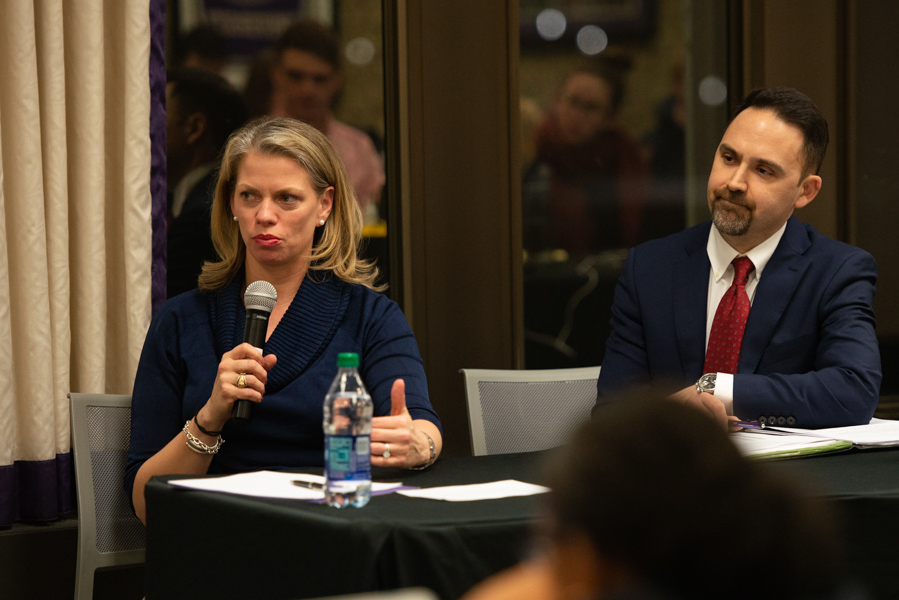Northwestern Residential Services commits to expanding gender-open housing, though details remain unclear
Noah Frick-Alofs/Daily Senior Staffer
Carlos Gonzalez and Julie Payne-Kirchmeier speak at Associated Student Government Senate on Wednesday. Administrators affirmed their commitment to expanding gender-open housing options, but did not offer a timeline for long-term change.
February 21, 2019
Northwestern administrators confirmed the University’s commitment to maintaining and expanding gender-open housing options for undergraduate students at a Q&A session held during Wednesday’s Associated Student Government Senate meeting.
Carlos Gonzalez, the director of housing operations and services, and Julie Payne-Kirchmeier, the associate vice president and chief of staff for student affairs, offered April as a tentative month for when the University will release changes to the current gender-open housing policy for the 2019-2020 academic year, but they refrained from committing to a timeline for long-term changes.
Administrators have long grappled with providing adequate options for students who desire gender-open housing. The University last expanded accommodations in 2013, leading to the current setup of single and suite options in Foster-Walker Complex, 560 Lincoln and Kemper Hall.
Gender-open housing has been on Residential Services’ radar for years, said SESP junior Adam Davies.
“It’s something that you guys have had the opportunity to work and time and time again,” Davies said addressing administrators. “What we see is that there is a lot of labor that is required of trans and gender non-conforming students and there is very little progress that is made.”
Many students, including Davies, have criticized the present arrangement, saying it leads to isolation from other students, high living costs and a lack of housing options on South Campus.
Those issues led Elynnor Sandefer, the Rainbow Alliance senator, to write a resolution demanding the University designate entire floors as gender-open by the beginning of the 2019-2020 school year and move toward a fully-integrated gender-open housing policy in the long term.
Senators and concerned students spent much of the Q&A trying to get Payne-Kirchmeier and Gonzalez to elaborate on the University’s plans for gender-open housing, but the administrators refused, citing the need to consult with relevant students and administrators before making commitments.
“You have to be engaged with the student body. We cannot sit at a table as administrators and say, ‘This is exactly how we need to approach this,’” Gonzalez said. “That’s where we’d like to have students who are interested in talking about this, interested in talking about the details that are a bit boring — but fascinating to me — about how we can make this work.”
One reason the University has remained vague is because of the breadth of issues administrators need to consider, Payne-Kirchmeier said. Those involved in the process of revamping gender-open housing will have to choose the buildings with the best facilities for transgender and non-binary students, lower costs and update the housing application to allow students to select gender-open housing.
Adjustments to the housing application will be slow because RMS, the company that operates NU’s housing portal, must be notified of the desired changes and be given time to implement them, Payne-Kirchmeier said.
One change administrators hope to implement immediately is the creation of a group of students with whom the University can consult concerning gender-open housing.
“The idea is that we would get a group together now. By now I mean you got folks by the end of the meeting who want to help us, tell us who you are,” Payne-Kirchmeier said. “We can get that group together to talk through some of the ideas here, and Carlos (Gonzalez) will lead that, and we can come back in April and say, ‘This is where we are.’”
Email: [email protected]
Twitter: @jalan_atul
Related Stories:
— ASG passes legislation demanding University immediately expand gender-open housing options
— Beyond the Binary: NU transgender students face obstacles navigating the housing process


